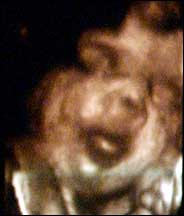|
"Although there are no confirmed biological effects for patients caused by exposures from present diagnostic ultrasound instruments, the possibility exists that such biological effects may be identified in the future," the American Institute of Ultrasound in Medicine said in a statement.
Dr. Lawrence Platt, former president of the group and a professor of obstetrics and gynecology at the University of California at Los Angeles, said elective ultrasounds could lead to mistaken diagnoses. "What if something is wrong with the baby?" Dr. Platt said. "Do these people know what to tell you?"
He said one of his patients came in thinking her baby was healthy after a nonmedical ultrasound. Other tests revealed a rare chromosomal condition that could have led to severe retardation and death. The woman ended her pregnancy. "There's no doubt that ultrasounds have been an incredible advance for science," he said. "We need to use the technology correctly. I hate to see this trend have a negative impact on the practice."
While the Food and Drug Administration regulates the equipment, licensing of health care providers is left to individual states. For the time being the companies do not need to be licensed, and the technicians do not need to be certified.
But Dr. Daniel G. Schultz, director of the agency's Center for Devices and Radiological Health, said the agency was advising states about the potential health risks of elective ultrasounds and ensuring that machines were labeled for specific medical functions. "In the end it's up to the states," he said.
So would the F.D.A. never ban such practices? "I wouldn't say never," Dr. Schultz said. "It's a gray area where our authority ends and the states' begins."
The closest step to a ban has come in the form of a bill proposed in New York to ensure that ultrasounds only be performed after a referral or order by a "licensed health care professional." The bill is now with the Senate Rules Committee. California passed a legislation to make elective ultrasound customers sign a waiver acknowledging that they know the F.D.A. does not approve of the practice. The legislation will take effect shortly.
Mr. Evans, who asks patients to be in contact with their own doctors and hires technicians certified by the American Registry of Diagnostic Medical Sonographers, strongly disagrees with dire assessments of elective ultrasounds' health risks. There is no proof that ultrasounds are harmful, he said, and mentioned that doctors often perform numerous ultrasounds when investigating possible fetal health problems. "The F.D.A. has scared a lot of women, but from my experience women aren't worried," he said.
Marilyn Crisp, who opened a similar service, Womb's Window, in Wilmington, N.C., wondered whether the F.D.A. had been swayed by the persuasive voice of the medical community, which may fear that business is being taken away by independent operators.
Some doctors do not object to elective ultrasounds. Dr. Haig Yeni-Komshian, an obstetrician-gynecologist in Chevy Chase, Md., recently accompanied a patient to Baby Insight and found the practice safe, likening it to portrait work. "There's no radiation involved with ultrasounds, just high-frequency waves," Dr. Yeni-Komshian said. "As long as women are still seeing their doctors, if they want to have this done, that's fine."
But for now such companies will continue to operate under intense scrutiny from medical officials. Not that it matters to Ms. Glaspie, whose doctor told her the procedure presented no risk to her baby as long as she "didn't get one done every day." She purchased a video of the experience and has shared it with her son, her boyfriend, her parents, her brother, sister and grandmother, along with "anyone else who is interested."
"Every time we watch, it gets us more excited," she said.
©New York Times
December 2004
part 1 | part 2
